高中英语人教版必修二-Unit2-Reading An Interview
- 格式:ppt
- 大小:7.19 MB
- 文档页数:22
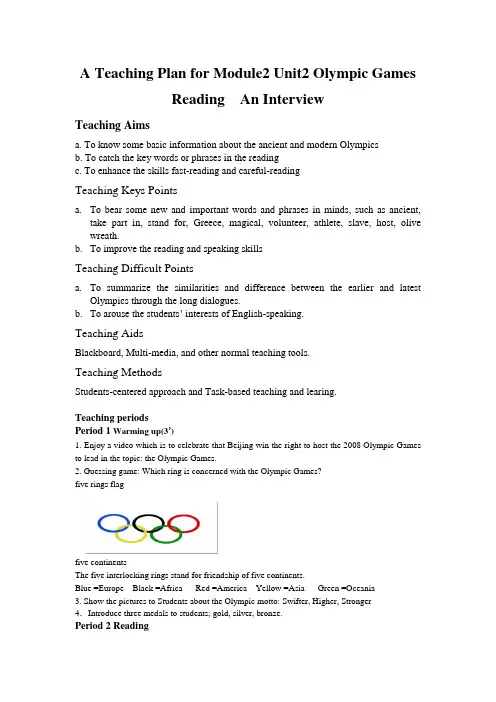
A Teaching Plan for Module2 Unit2 Olympic GamesReading An InterviewTeaching Aimsa. To know some basic information about the ancient and modern Olympicsb. To catch the key words or phrases in the readingc. To enhance the skills fast-reading and careful-readingTeaching Keys Pointsa.To bear some new and important words and phrases in minds, such as ancient,take part in, stand for, Greece, magical, volunteer, athlete, slave, host, olive wreath.b.To improve the reading and speaking skillsTeaching Difficult Pointsa.To summarize the similarities and difference between the earlier and latestOlympics through the long dialogues.b.To arouse the students’ interests of English-speaking.Teaching AidsBlackboard, Multi-media, and other normal teaching tools.Teaching MethodsStudents-centered approach and Task-based teaching and learing.Teaching periodsPeriod 1 Warming up(3’)1. Enjoy a video which is to celebrate that Beijing win the right to host the 2008 Olympic Games to lead in the topic: the Olympic Games.2. Guessing game: Which ring is concerned with the Olympic Games?five rings flagfive continentsThe five interlocking rings stand for friendship of five continents.Blue =Europe Black =Africa Red =America Yellow =Asia Green =Oceania3. Show the pictures to Students about the Olympic motto: Swifter, Higher, Stronger 4.Introduce three medals to students; gold, silver, bronze.Period 2 ReadingStep1 Pre-reading(6’)A. Let us have a competition to check who know the most knowledge about the Olympic Games1.When and where did the ancient Olympic Games start?A. 776BC; in GreeceB. 776 AD.; in Greece2. Who was China’s first gold medal winner and for what event?A.Xu Haifeng; shootingB. Xie Jun running3. Who got the golden medal in 110-metre hurdle in 2004 Olympic Games?A Liu Xiang B. Li Xiaopeng C. Fu Mingxia4. Which one is the mascot of Beijing Olympics?A B C D5 What is the motto of Beijing Olympic Games?A Welcome to Beijing B. One world one dream C New Beijing New OlympicsB. Before reading, teacher teaches students to read the new words.ancient, take part in, stand for, Greece, magical, volunteer, athlete, slave, host, olive wreath.Step2 While-reading(19’)1. Fast reading : True or False.( )1. Women and slaves were allowed to take part in the ancient Olympic Games.( )2. The 2012 Olympic Games will be held in China.( )3. In the modern Olympics, the winner will be given olive wreath.( )4. A special village is built for competitors to live in.( )5. The modern Olympics are held every four years.2. Careful readingTell the difference between ancient and modern Olympics according to the reading passage. What do they mainly talk about?A. History about the Olympic GamesB. The differences and similarities between the ancient and modern Olympic GamesC. 2008 Olympic GamesName The ancient Olympics The modern OlympicsTime every four yearsPlace in GreecePeople men and womenStep3: Post-readingDiscussion(8’)Imagine if the Olympic Games will be held in Hainan, what can we do for it? (Teacher will give some hints to Ss , such as behavior, language, environment, culture.)1.Encourage the public to plant more trees and grass.2.Have good manners in public so as to leave a good impression on foreigners.3.Have a good knowledge of English and encourage the public speak English widely.4.Be Volunteers to be guides for foreigners5.Learn the spirit of the Olympic Games and regard its motto as life and study motto.6.Spread our local culture to other people,especially foreigners.Period3 Revision (3’)1.What words have we learnt?athlete运动员take part in 参与stand for代表…2.What useful structures have we learnt?Passive voice(被动语态):sth be done/ sth will be done…3.What information do we get from thetext?The similarities and difference betweenthe ancient and modern Olympics.Period4 Homework (1’)1.Surf the Internet to learn more information about Olympic Games2.Find out and underline the important language points in this unit.3.Prepare for the next period.。
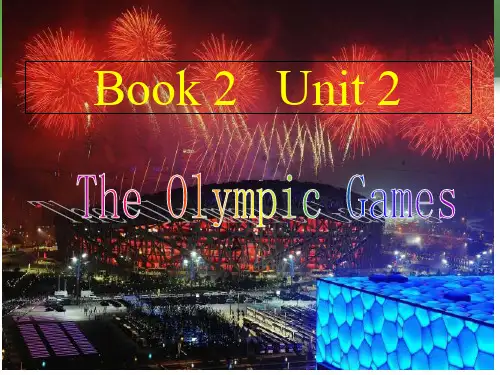
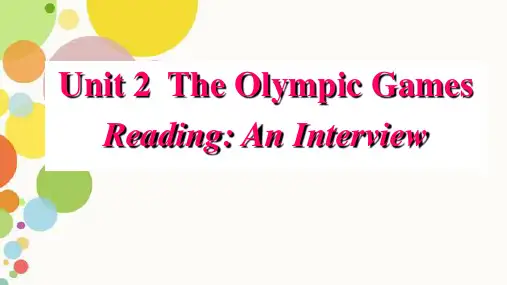
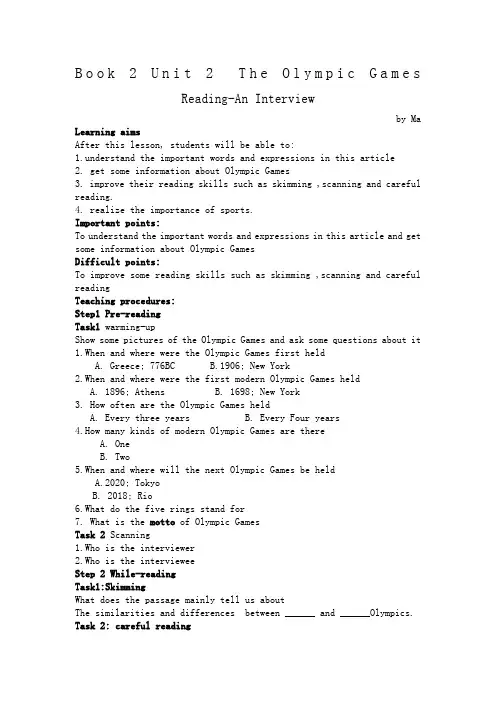
B o o k2U n i t2T h e O l y m p i c G a m e sReading-An Interviewby Ma Learning aimsAfter this lesson, students will be able to:1.understand the important words and expressions in this article2. get some information about Olympic Games3. improve their reading skills such as skimming ,scanning and careful reading.4. realize the importance of sports.Important points:To understand the important words and expressions in this article and get some information about Olympic GamesDifficult points:To improve some reading skills such as skimming ,scanning and careful readingTeaching procedures:Step1 Pre-readingTask1 warming-upShow some pictures of the Olympic Games and ask some questions about it1.When and where were the Olympic Games first heldA. Greece; 776BCB.1906; New York2.When and where were the first modern Olympic Games heldA. 1896; AthensB. 1698; New York3. How often are the Olympic Games heldA. Every three yearsB. Every Four years4.How many kinds of modern Olympic Games are thereA. OneB. Two5.When and where will the next Olympic Games be heldA.2020; TokyoB. 2018; Rio6.What do the five rings stand for7. What is the motto of Olympic GamesTask 2 Scanning1.Who is the interviewer2.Who is the intervieweeStep 2 While-readingTask1:SkimmingWhat does the passage mainly tell us aboutThe similarities and differences between ______ and ______Olympics. Task 2: careful readingChoose the best answers according to the text.1.Why did Pausanias come to China from Ancient GreeceA.To watch the present-day Olympic Games.B.To find out the present-day Olympic GamesC.To take part in the present-day Olympic GamesD.To work as a volunteer for the 2008 Olympic Games2.Which of the following can’t be included in the Summer Olympic GamesA.Running racesB. SwimmingC. SailingD. Skiing3.Why do so many countries compete for hosting the Olympic GamesA.Because it can bring in lots of money to the host country.B.Because it can make the host country win more medals.C.Because it’s a great responsibility and a great honour.D.Because it can make the host country stronger.4.Which word can best describe Pausanias’ feelingA.DisappointedB. AngryC. SadD.SurprisedStep 3 Post-readingTask 1: summaryGo through the text and find out more details about the ancient andCan you tell the benefits of holding the Olympic GamesStep 4 HomeworkFinish your writing about the benefits of holding the Olympic Games.。
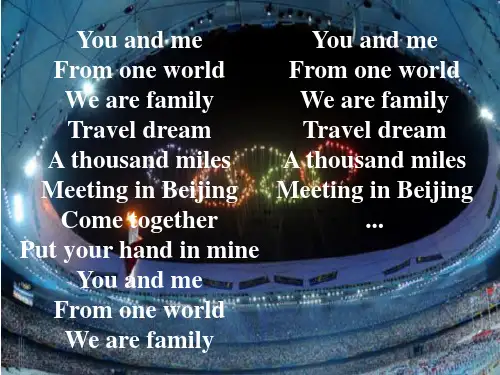
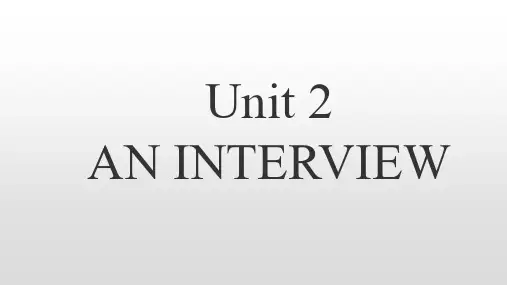
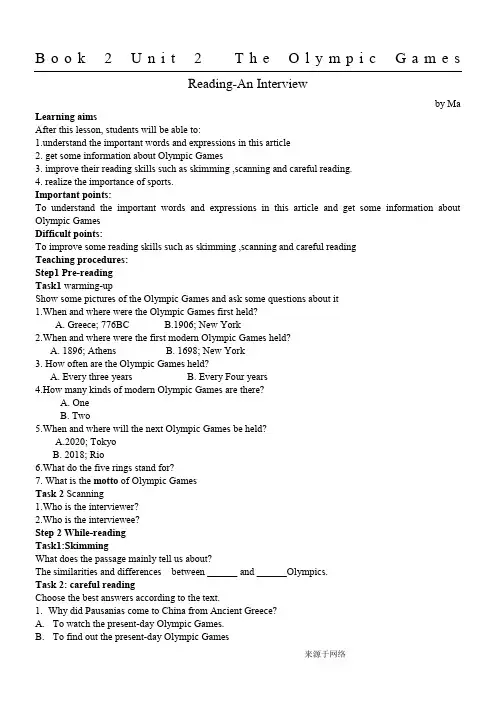
B o o k2U n i t2T h e O l y m p i c G a m e sReading-An Interviewby Ma Learning aimsAfter this lesson, students will be able to:1.understand the important words and expressions in this article2. get some information about Olympic Games3. improve their reading skills such as skimming ,scanning and careful reading.4. realize the importance of sports.Task1Task 22.Who is the interviewee?Step 2 While-readingTask1:SkimmingWhat does the passage mainly tell us about?The similarities and differences between ______ and ______Olympics.Task 2: careful readingChoose the best answers according to the text.1.Why did Pausanias come to China from Ancient Greece?A.To watch the present-day Olympic Games.B.To find out the present-day Olympic Games来源于网络C.To take part in the present-day Olympic GamesD.To work as a volunteer for the 2008 Olympic Games2.Which of the following can’t be included in the Summer Olympic Games?A.Running racesB. SwimmingC. SailingD. Skiing3.Why do so many countries compete for hosting the Olympic Games?A.Because it can bring in lots of money to the host country.B.Because it can make the host country win more medals.C.Because it’s a great responsibility and a great honour.D.Because it can make the host country stronger.4.Which word can best describe Pausanias’ feeling?来源于网络。
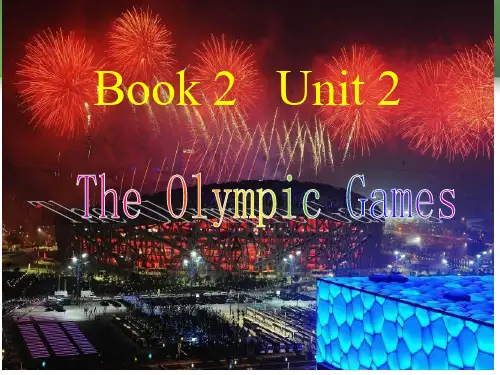
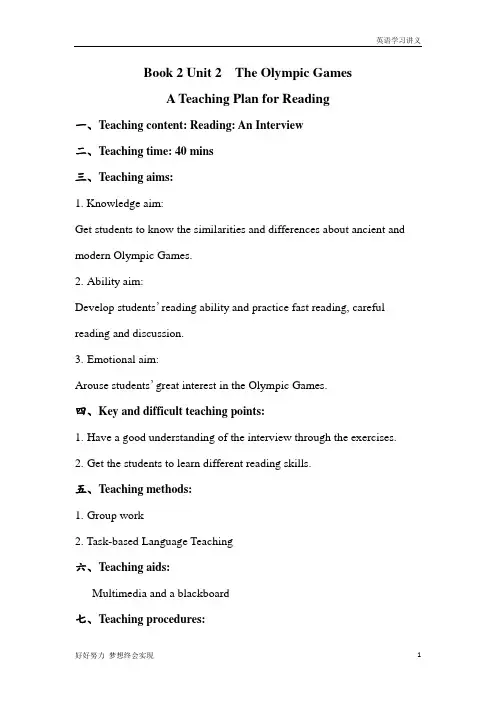
Book 2 Unit 2 The Olympic GamesA Teaching Plan for Reading一、Teaching content: Reading: An Interview二、Teaching time: 40 mins三、Teaching aims:1. Knowledge aim:Get students to know the similarities and differences about ancient and modern Olympic Games.2.Ability aim:Develop students’ reading ability and practice fast reading, careful reading and discussion.3.Emotional aim:Arouse students’ great interest in the Olympic Games.四、Key and difficult teaching points:1.Have a good understanding of the interview through the exercises.2.Get the students to learn different reading skills.五、Teaching methods:1.Group work2. Task-based Language Teaching六、Teaching aids:Multimedia and a blackboard七、Teaching procedures:Step1 Pre-reading1.Greeting2.Lead-in(1)Lead in the new content by showing pictures about the Olympics. (2)Let students know about some new words.Step2 While-reading1. Fast reading:Read the interview fast and get the main idea of the interview.2. Careful reading:Read the interview carefully and find out the detailed information. Step3 Post-readingplete the summary of the text.2.Make an interview about the Olympic Games.八、Homework1. Review the interview.2. Pick out the difficult words, expressions, sentence patterns .Book2 Unit2 The Olympic Games ( Reading )导学案一、Fast reading:Read the interview fast and get the main idea of the interview.This interview is mainly about ____.A. A magic journey by Pausanias.B. The similarities and differences about the ancient and modern Olympics.C. The ancient Olympic Games in Greece.二、Careful reading:(一)Read the interview carefully and choose the best answers.1. Pausanias was _____.A. a wrier who lived in “Ancient Greece”B. an English writer 2,000 years agoC. a writer who wrote about the modern Olympic gamesD. an athlete2. How often are the Winter Olympics held?A. Every years.B. Every other year.C. Every three years.D. Every four years.3. Where do all the competitors live?A. A hotel.B. A special village.C. A restaurant.D. A place hired by competitors.4. Which of the following statement is TRUE?A. Greek slaves and women could take part in the ancient Olympics in Greece.B. It is easy to win the right to host the Olympics.C. Almost every country wants to host the Olympics.D. It costs little to host the Olympics.5. Which of the following events isn't included in the Summer Olympic Games?A. Running races.B. Sailing.C. Swimming.D. Ice skating.(二)Find out the similarities and differences between ancient and modern Olympics.Similarities:1. ______ are allowed to take part in both in ancient and modern Olympics.2. The athletes compete not for money but for _______.3. The mottos are the same. They are______ , _______ and _______. Differences:Ancient Olympics Modern OlympicsEvents Only a few 4. ____________________Host country 5. __________________ From all over the world Prize 6. __________________ medals三、Post-reading1. Complete the summary of the text.The Olympic Games are the biggest sports meeting in the world, which include two kinds, the (1)________and the Winter Olympics. Both of them are (2)______ every four years. All countries can(3)______ part iftheir(4) __________ are good enough to the games.Women are not only allowed to join in but playing a very important role.A special village is built for the(5)____________ to live in, some stadiums(6)_____competitions, a large swimming pool, and a gymnasium as(7) ______.It’s a great honour to(8)_ ______the Olympic Games. The Olive wreath has been (9)_________ by medals. But it’s still about being able to run (10) _______, jump higher and throw further.2. Make an interview. Suppose you are a reporter, and do an interview about the Olympics.You can ask the following questions or other questions about Olympics:(1) How often are the Olympics Games held?(2) What's the motto of the Olympics?(3) Where was the 2008 Olympics Games held?(4) Who was China's first gold medal winner and for what event?四、Homework(1) Review the interview.(2) Pick out the difficult words, expressions, sentence patterns .。
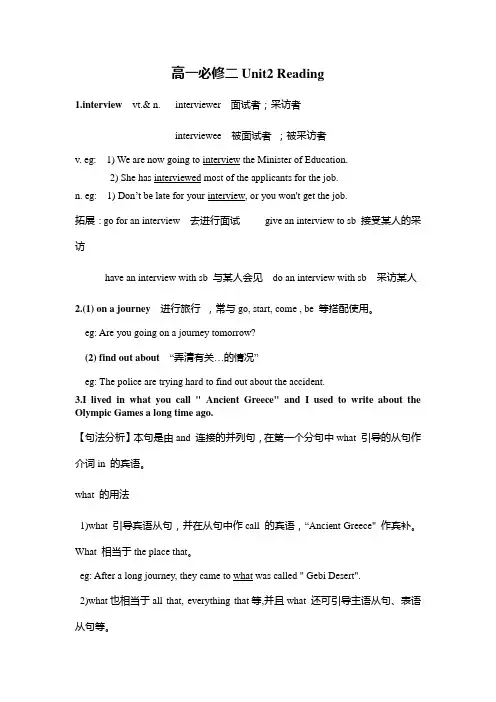
高一必修二Unit2 Reading1.interview vt.& n. interviewer 面试者;采访者interviewee 被面试者;被采访者v. eg: 1) We are now going to interview the Minister of Education.2) She has interviewed most of the applicants for the job.n. eg: 1) Don’t be late for your interview, or you won't get the job.拓展:go for an interview 去进行面试give an interview to sb 接受某人的采访have an interview with sb 与某人会见do an interview with sb 采访某人2.(1) on a journey进行旅行,常与go, start, come , be 等搭配使用。
eg: Are you going on a journey tomorrow?(2) find out about“弄清有关…的情况”eg: The police are trying hard to find out about the accident.3.I lived in what you call " Ancient Greece" and I used to write about the Olympic Games a long time ago.【句法分析】本句是由and 连接的并列句,在第一个分句中what 引导的从句作介词in 的宾语。
what 的用法1)what 引导宾语从句,并在从句中作call 的宾语,“Ancient G reece" 作宾补。
What 相当于the place that。
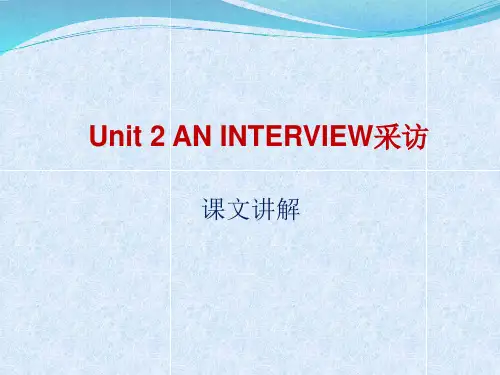
人教版高中英语必修二教案:Unit2+Reading2.Careful reading:Read the ___.3.n:Discuss the ___.Step3 Post-readingnguage focus:Learn the new words and phrases from the interview.2.Group work:Work in groups to create a poster about the Olympic Games.Step4 HomeworkWrite a short paragraph about your favorite Olympic sport and why you like it.Step5 SummarySummarize the key points of the ___.Teaching Plan for Reading: An Interview about the Olympic Games___: ___.___: 40 minutes___ Aims:1.Knowledge Aim: ___.2.Ability Aim: To develop students' reading skills through fast reading。
careful reading。
and n.3.nal Aim: To arouse students' interest in the Olympic Games.Key and Difficult ___:1.___ ___.2.Learning different reading skills.___:1.Group work2.Task-based Language Teaching___: ______:Step 1: Pre-Reading1.___.2.Introduce ___.Step 2: While-Reading1.Conduct fast reading to get the main idea of the interview.2.___.3.Discuss ___.Step 3: Post-Reading1.Focus on language by learning new words and phrases.2.Work in groups to create a poster about the Olympic Games.Step 4: HomeworkWrite a short paragraph about your favorite Olympic sport and why you like it.Step 5: SummarySummarize the key points of the ___.Book 2 Unit 2: The Olympic Games (Reading) Study GuideI。
帕萨尼亚斯是两千年前的一位希腊作家,他作了一次2007年3月18日的魔幻旅行,来弄清当今的奥林匹克运动的情况。
现在他正在采访一位2008年奥林匹克运动会的志愿者李燕。
P:我叫帕萨尼亚斯。
我生活在你们所说的“古希腊”。
我曾经写过很久以前奥林匹克运动会的情况。
现在我来到你们这个时代,想了解有关现代奥运会的情况,因为我知道2004年奥运会是在我的祖国举行的。
我可以问你几个有关现代奥林匹克运动会的问题吗?L:天哪!你真的来自那么久远的年代吗?当然你可以问你想问的问题。
你想知道什么呢?P:你们的奥运会多久举办一次?L:每四年一次。
运动会主要有两种:夏季奥运会和冬季奥运会。
这两种运动会都是四年举行一次。
冬季运动会总是在夏季奥运会的前两年举行。
只有到达他们各自项目统一标准的运动员才会被接受参加奥运会。
选手可以来自世界的任何一个地方。
P:冬季奥运会?冬天运动员怎么可能赛跑呢?又怎么可能赛马呢?L:噢,不!冬季奥运会没有跑步和赛马项目。
但是却有滑冰和滑雪项目这类需要冰雪的比赛项目,所以才叫它冬季奥运会。
跑步,游泳,划船和一些团队项目是在夏季运动会上进行。
P:我明白了。
你原来说邀请来的运动员来自世界各地。
你指的是希腊范围吗?我们希腊各个城市之间曾经为了赢得荣誉而彼此竞争。
别的国家不能参加。
L:现在,只要他们的运动员达到了参赛的标准,任何国家都能参赛。
总共有250多个运动项目,每个项目都有自己的标准。
妇女不仅允许参加,而且她们还在体操,竞技和团队等比赛项目中起着非常重要的作用……P:清等一下,所有这么多项目,所以这么多国家。
甚至妇女也都参加!所有这些参赛的人都住哪里呢?L:每届奥运会有一个特殊的村庄(奥运村)供参赛人居住,一个主要的接待大楼,好几个供比赛用的体育场,还有一个室内体育馆。
P:那听起来要花很多钱吧。
会有人想承办奥运会吗?L:事实上,每个国家都想抓住这个机会。
被选中的不仅要承担巨大的责任,同时也享有巨大的荣誉。